Manga? Check. Slice of life? Check. Short yet natural sentences? Check. Cute but not-too-childish illustrations? Check! ✅
The manga series, しろくまカフェ (Shirokuma Café) checks off all the boxes for what a popular Japanese learning resource is. There are many reviews on the internet raving about this particular series, describing it as "perfect" for Japanese learners — especially beginners. I also know quite a few Japanese learners around me who own this particular managa series, which I don't think is pure coincidence.
That's why I was surprised to hear so many conflicting opinions about Shirokuma Café when I was writing an article about Japanese book recommendations for upper beginners. Many Japanese learners, especially those from the WaniKani Community (where online book clubs for Japanese learners are very active), say that they wouldn't recommend this series for beginners.
I had only heard about the series at that point. However, I still had no doubt that Shirokuma Café would make it into the article, since I knew it — along with Yotsuba&! — was one of the most popular manga among Japanese learners. However, as I reviewed the series myself and talked to Japanese learners who had read it, I became convinced that I shouldn't include it in the list of book recommendations for upper beginners — but instead, write a dedicated review for it.
I am writing this review article in the hope that you can decide if the series is for you. Also, for those of you who already own the book, but ended up tsundoku-ing it — I hope this in-depth review will help you understand the series better and figure out how to enjoy it when you decide to give it another shot!
What is "Shirokuma Café"? ☕️ 📕
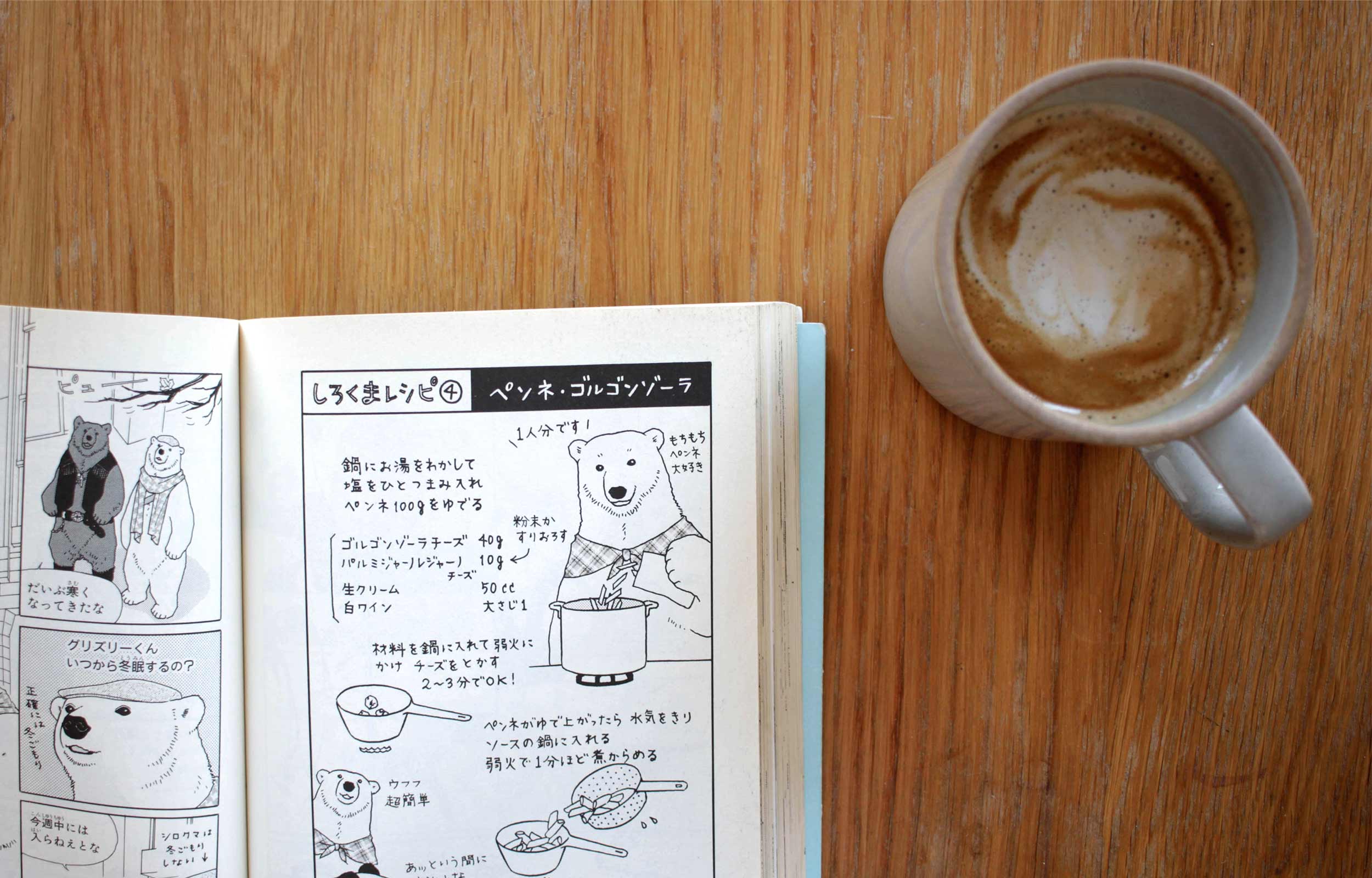
In case you are not familiar with Shirokuma Café at all, it is a manga series about a very chill (but also lazy) panda bear who frequents Polar Bear's Café, and interacts with the coffee shop owner, who is a polar bear. The story happens in a world where animals act just like, and cohabitate with, humans. Despite the unrealistic setting, it somehow starts feeling natural, as if you're a part of the world with all the adorable animals who speak in a human language.
Since it started as a series in a monthly manga magazine targeted at a female readers over the age of 30, the series has a significant fan base of adults. It's been adapted as an animation, which is popular among Japanese learners as well. The series is intended to be an iyashikei 癒し系 manga, which is a popular genre in Japan that is "mentally healing."
Shirokuma Café As Material For Reading Practice
Now, let's talk about the elephant in the room: is Shirokuma Café a good learning material for beginners' reading practice? After reviewing the manga series and talking to a handful of learners who tried reading the series, I wouldn't say it's perfectly beginner-friendly, especially for those who are learning Japanese from textbooks. To give an idea of what's not-so-good for beginners about it, here are some of the significant challenges your fellow Japanese learners have struggled with.
- Puns with obscure vocabulary and cultural references
- Casual speech style
- Really slow-paced story
Now, let's take a close look at each point.
1. Puns with Obscure Vocabulary and Cultural References
One of the main characters, Polar Bear, is a cool and stylish guy who owns a coffee shop that attracts media attention. But at the same time, he's pretty corny. Especially earlier in the series — in the first dozen chapters or so — you'll find an abundance of his puns. And this seems to be the biggest challenge for Japanese learners.
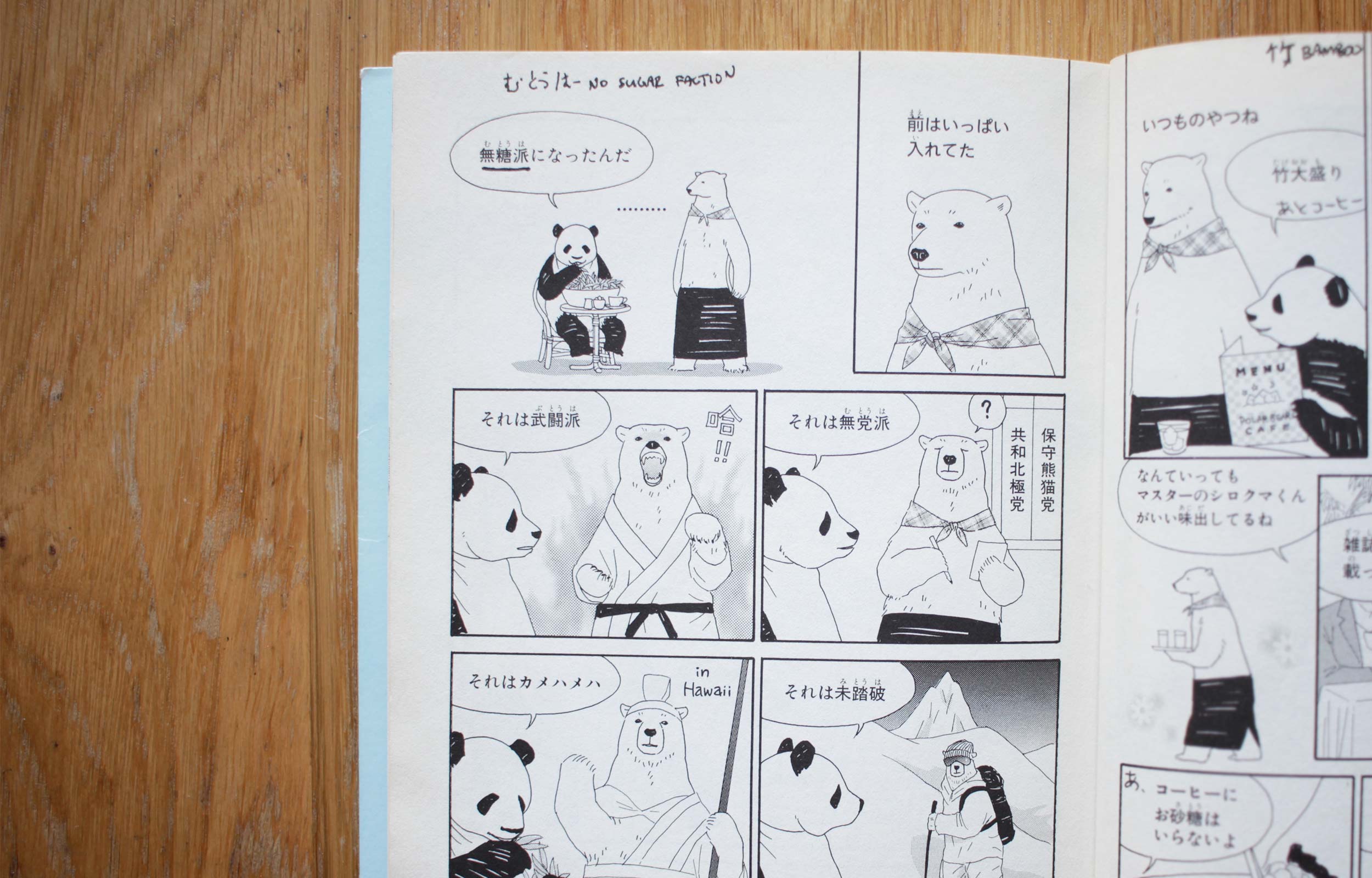
Polar Bear's puns generally involve him picking up on a word that someone else has said, and playing with other words that rhyme with the original word, usually with the help of props. For example, when Panda rejects Polar Bear's offer of sugar in his coffee, Panda says:
- 無糖派になったんだ。
- I've stopped taking sugar.
If I break it down, 無糖 means "no sugar" and 派 is a suffix used to indicate preferences. The original meaning of 派 is "faction" or "sect." So in a way, Panda's saying that he's joined the no-sugar club. You can use this suffix for lots of other preferences too. For example, "a dog person," as in a person who likes dogs (often implying "compared to cats"), is 犬派 and "a tea person," compared to "a coffee person," is お茶派 in Japanese.
The next panel shows Polar Bear holding up signs that say 保守熊猫党 (Conservative Panda Party) and 共和北極党 (Republican Polar Party), which are made-up political party names. Panda responds to them by saying:
- それは 無党派
- That's the "no-party" type.
(In other words, "politically independent")
Just like that, they keep making the same type of exchanges for the next few panels using words that rhyme with むとうは — 武闘派 ("Martial Arts" type), 未踏破 (unexplored) and カメハメハ ("Kamehameha," the founder of the Kingdom of Hawaii).
Now, whether you find theses jokes funny or not, I hope they give you an idea of the kind of puns you can expect in Shirokuma Café. The roles in this type of comedy exchange are called "boke" and "tsukkomi," and they're common in Japanese comedy double acts known as manzai. One comedian plays the role of boke, who acts kind of spacy and tends to misinterpret or forget things, and the other plays the role of tsukkomi, who points out the errors the boke makes and then corrects them.
This is what one Japanese learner who has read Shirokuma Café had to say about Polar Bear's puns:
Reading through Polar Bear Café, I found the puns to be difficult to follow because they're often obscure cultural references, as well as because they often used uncommon words. I had amassed a vocabulary of probably about 2,400+ words previously, and I was looking up words for just about every pun.
@ChristopherFritz
Even for advanced learners or those familiar with Japanese culture, the cultural references used in Shirokuma Café are often too obscure. The level of the vocabulary used is advanced — some are not words you see in daily life. So it's only natural that you don't get the jokes, if you are a beginner. I must admit, there are a few obscure katakana words that I didn't recognize either, despite having been born and raised in Japan.
Although looking up words and grammar is expected in reading practice, since a good chunk of the early part of the series is pun-oriented, it feels discouraging for learners not to be able to fully enjoy it. It's a slice-of-life manga, so skipping the pun part actually won't affect the storyline much. However, I can see how people would want to read the first part of thes story to get familiar with the characters and setting — and it feels like it would be challenging to miss out on that.
After the first dozen chapters or so, the puns get more occasional. If you decide to read Shirokuma Café, my advice would be not to worry too much about understanding those puns. Just take it as a sign of the polar bear being silly and goofy. Skip the pun part if you find it too hard rather than giving up — it'll be light on the puns later.
2. Casual Speech Style
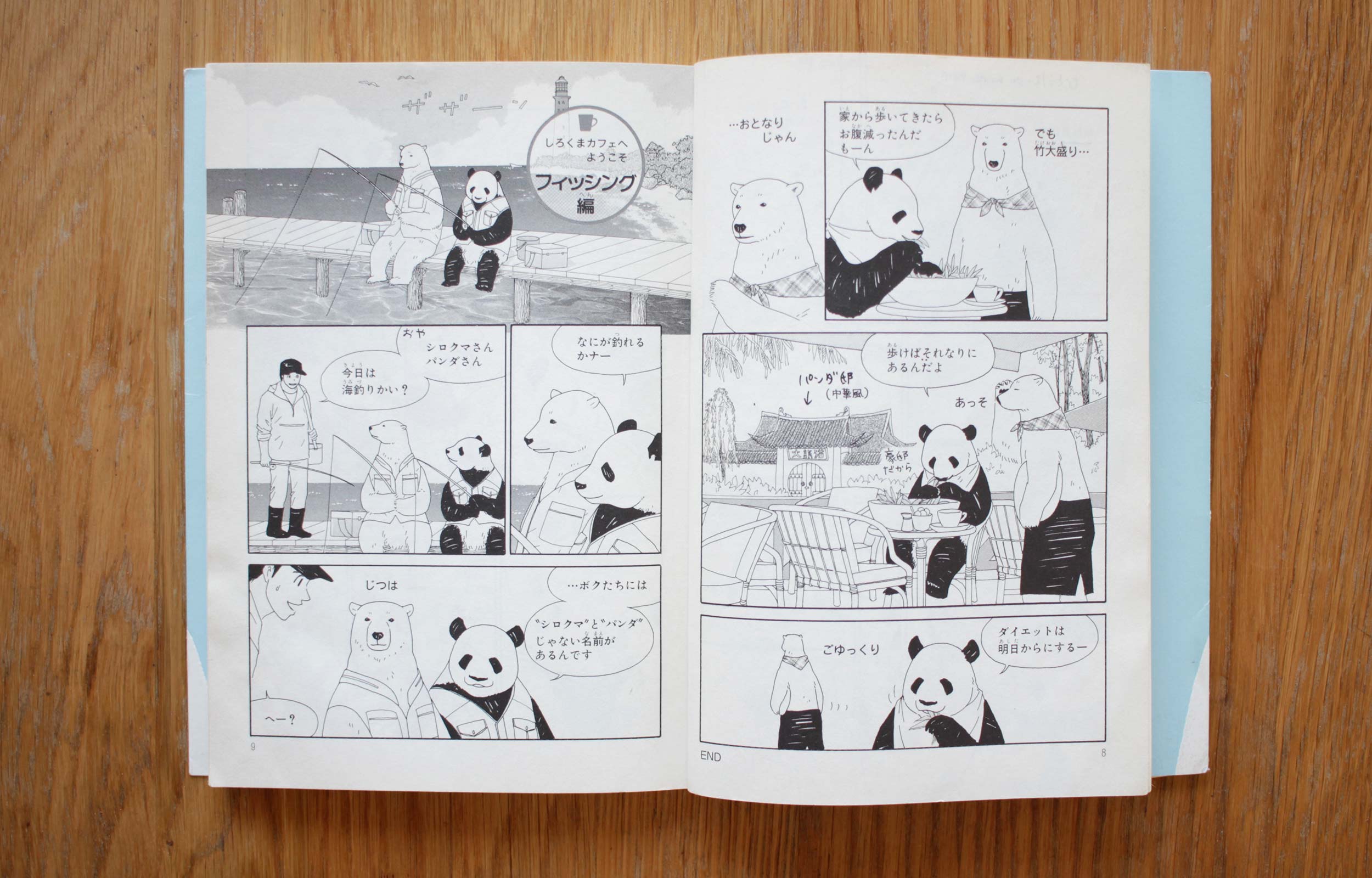
The casual speech style itself is quite common in manga in general, especially those of the slice-of-life variety. Compared to Yotsuba&!, another popular manga for Japanese learners, the level of casualness isn't too different. And, casual expressions are not a bad thing to learn — running into these expressions in manga will help you get familiar with the style, which you could run into again in some other manga/anime, or even in real life.
However, for beginner readers, especially for extensive reading, it's essential to pick materials that aren't too challenging for your level and to be able to enjoy them without looking up every single thing you run into. Beginners, especially those who are learning Japanese from textbooks and are new to reading Japanese books, tend to find casual speech quite tricky. For example, one of the fellow learners, who tried reading Shirokuma Café as a beginner, says:
I tried reading Shirokuma Café when I was around level 11 to 15 on WaniKani, and for grammar, I was still going through the Genki 2 book. Back then, I found Shirokuma Café a bit challenging for complete beginners, not because of the grammar, but because they often speak informally, and this isn't something that is taught in books like Genki. At least I wasn't used to that.
V.L.
And for this reason, some people recommend Flying Witch, which is another slice-of-life manga. The main character speaks in the polite form, which is often more familiar and easy-to-understand for beginners.
I can see Shirokuma Café being more beneficial and easier to read if you're already familiar with casual style speech. If you are learning Japanese in an immersive environment and are exposed to others speaking in casual form, you might be ready to read it.
And, even if you are learning Japanese from textbooks, when you are getting more comfortable with reading in general, and more mentally prepared to learn casual expressions, it could be a good resource as well. The speech style of most of the characters in Shirokuma Café is natural-sounding — they are safe to copy and use with your Japanese friends. However, there are a few characters who speak differently, and you might want to be aware of that in case you are planning to copy the way these characters talk. For example, Grizzly Bear is portrayed as manly and vulgar, and Panda's mom sounds very mom-like.
3. Really Slow-paced Story
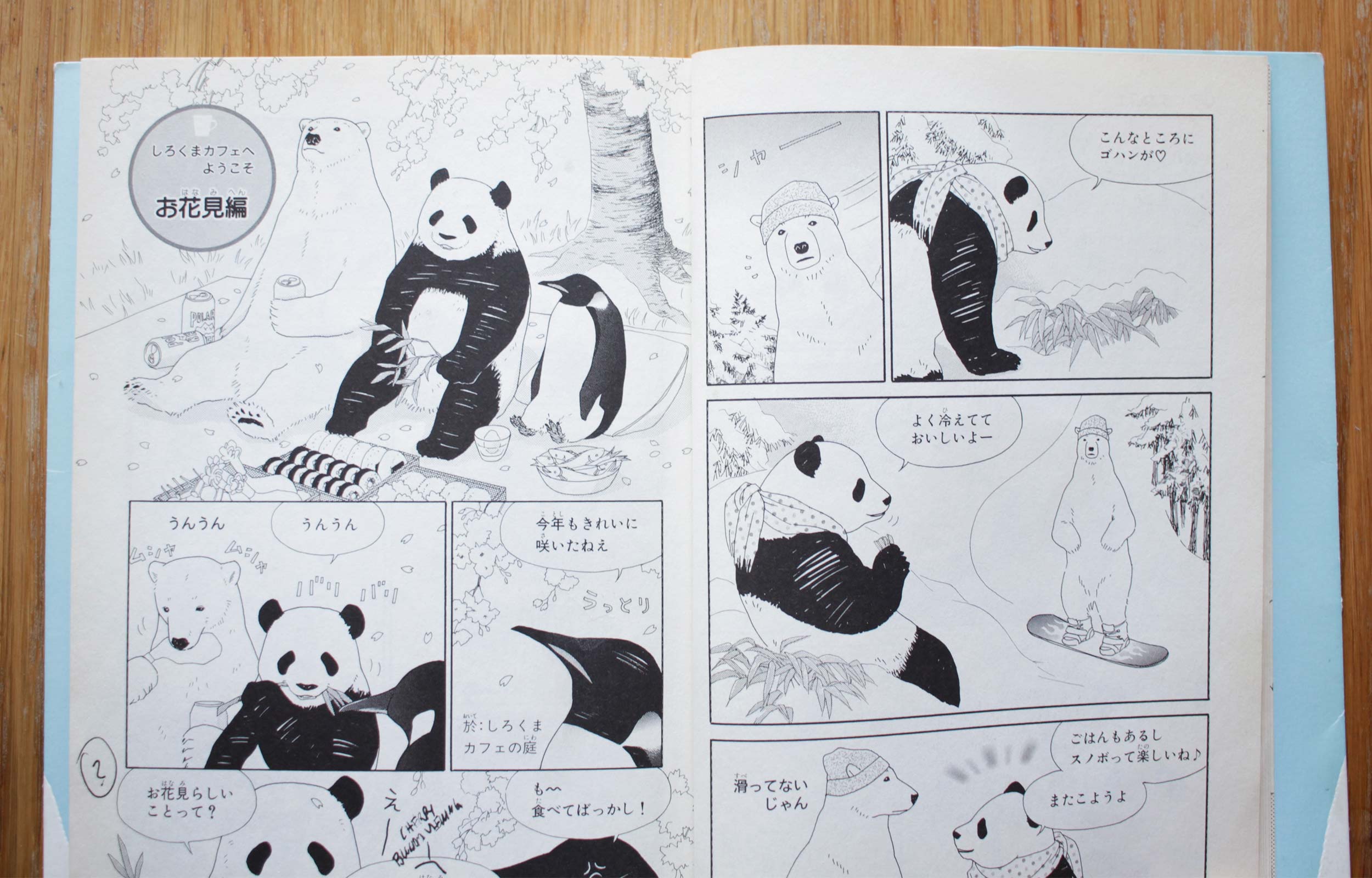
As expected for an iyashikei manga, the world in Shirokuma Café is very peaceful. There are hardly ups and downs in the story, and that could feel pretty slow to some people. Although the same can be said for many slice-of-life types of work, Shirokuma Café is extra slow, especially the first volume of the series. Some of you might say, "I know! I've watched the anime adaptation, but I still enjoyed it!" — Well, I gotta tell you, the manga version is even slower.
For purely Japanese learning purposes, the story may not seem that relevant. However, that turned out to be the nail in the coffin for many fellow learners to give up on reading the series. For example, one said:
I was part of the book club but dropped the book halfway for three reasons. It used a lot of slang and casual speech which is always hard for a beginner (which I was, back then). Its humor mainly consists of weird language puns or cultural reference puns which I found extremely hard to get. Other than that, the story is quite slice-of-life with nothing really happening. It wasn't interesting enough to keep me going.
@NicoleRauch
With not so much happening in the story, the focal point of the series often feels like the nuances of over-realistically personified animal characters blending into human society. For example, animals get paid to work at the zoo. Also, all the dad jokes the coffee shop owner, Polar Bear, makes. These nuances can be hard to grasp for beginner learners.
Personally, story-wise, I enjoyed Yotsuba&! a lot more. It kept me entertained and made me want to read more, as there are more exciting and interesting events in the Yotsuba&! series. Even if you are reading just to study Japanese, the storyline is still important for staying motivated and to keep reading. So if you are not the type of person who enjoys stories that are too chill, Shirokuma Café might not be for you.
…And, Realistic Illustrations
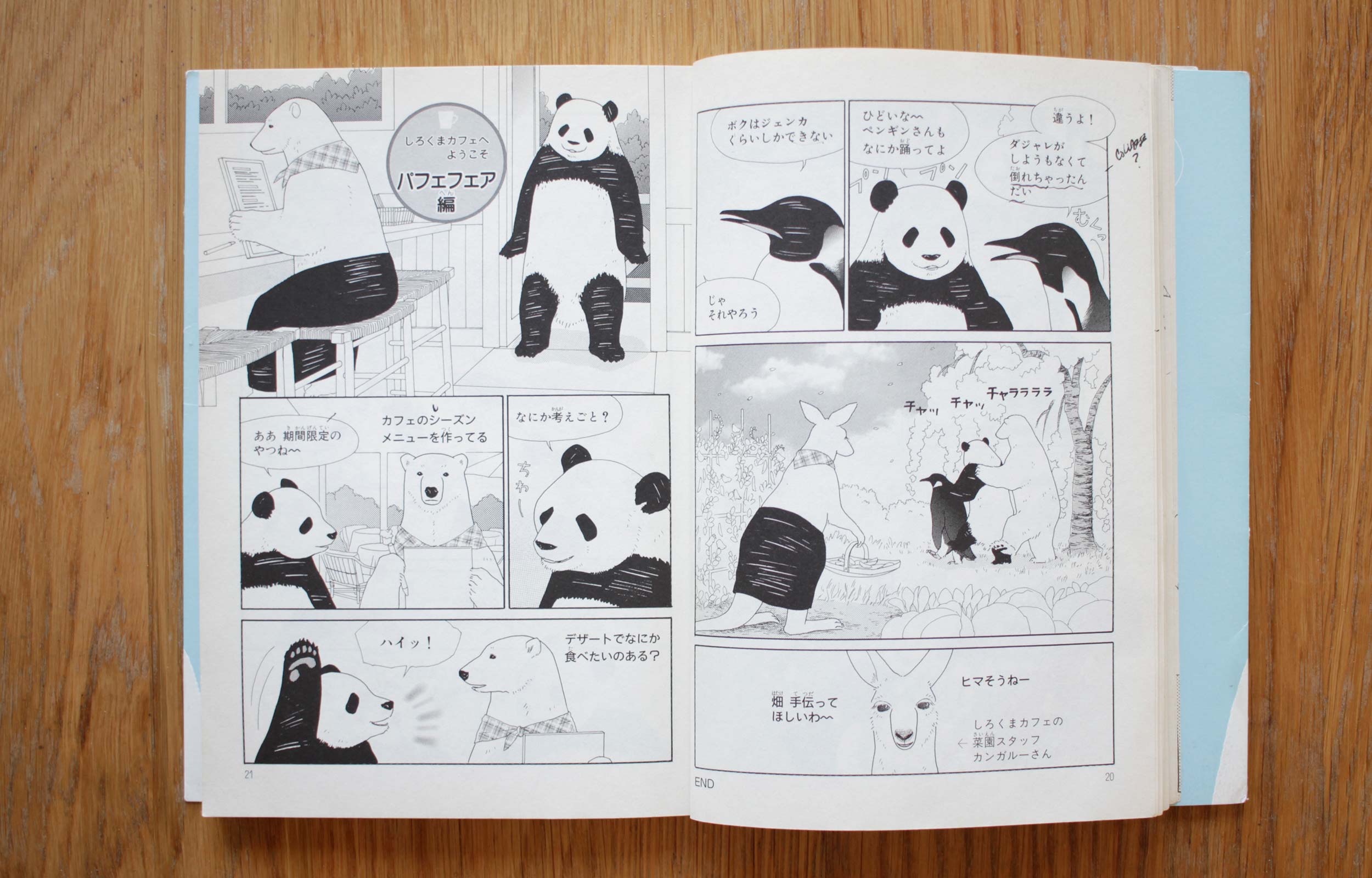
Sorry, that actually wasn't the last thing. This is not something that fellow Japanese learners mentioned, but I wanted to point it out.
Manga has the advantage of offering visual cues, and the art style can be an important factor for a learner. In Shirokuma Café, the animal characters are portrayed with a realistic touch. They are still cute, but not in a childish or typical manga/anime character type of way. This is likely one of the reasons the series has such a big adult following and is a popular resource for Japanese learners.
Although we can see the author's effort to draw animals in detail and as realistically as they can, it's sometimes hard to read the emotions and actions of the animal characters. For example, you can't see the eyes of Panda and some other characters like the penguins because their faces are painted black. So compared to typical manga/anime characters, the facial expressions and movements are not as clear.
The realistic illustrations are great, and seem to be a specialty of the author. While it's admirable, it's also true that visuals play an essential role in understanding manga for beginners.
Is Shirokuma Café For Me?
The overall review of Shirokuma Café might have sounded negative, but please know that it was because I was trying to be critical so I can clear the myth of Shirokuma Café being the perfect book for beginners. I just think it's a bit misleading to recommend it for all beginners, regardless of their learning background. Books have different kinds of challenges, and I think it's important for learners to know what to expect.
So, this review doesn't mean I wouldn't recommend the series to any Japanese learner. As a native speaker, I enjoyed the contents of Shirokuma Café. For learners, I think it'll be a fun read, if your level and goal match the content. And, I believe it could be a great learning material if you are…
- a fan of the anime adaptation (thus, already familiar with the speech style)
- familiar with casual speech and wanting to practice reading more casual expressions
- comfortable reading Japanese books and are wanting to learn casual expressions
Before you decide to get a copy, make sure to check out the sample pages to see what it's really like inside the book and if it's manageable for you.
As mentioned earlier, the first dozen chapters or so are pun-oriented, and puns get less frequent after that. That said, format-wise, Shirokuma Café isn't very consistent overall. This is the same for the length of a chapter or the volume of dialogue per chapter — so you might find some parts more challenging than others.
So, if you decided to pick up a copy, keep this in mind: give yourself permission to skip parts (or even whole chapters) if you're having a hard time understanding them, especially the puns and cultural references. Also, don't forget to check out the WaniKani Community Book Club thread. The original Shirokuma Café reading club is no longer active, but you can still ask questions and benefit from the past discussions and shared resources, like the vocabulary list.
Mami’s Review
I totally understand why this manga is referred to as 癒し系 (mentally healing). The animal characters are adorable and I find their silly humor very cute and chuckle-worthy. I like that Polar Bear serves a special menu only for his friend Panda Bear, 竹 大盛り (bamboo salad, L-size), at his cafe. I like that Panda Bear goes to a job interview at a local zoo and gets a part-time “panda” position. If you are looking for a cozy and relaxing manga that’s fairly easy to read, this is the one!
Jenny’s Review
I enjoyed being immersed in the cute, quirky world of しろくまカフェ and its patrons, and I felt like I learned a lot. Depending on your Japanese level, I’d recommend having a good dictionary — and maybe Wikipedia! — on hand to help you understand the word play and cultural references. If that doesn’t appeal, you could always just go with the flow and enjoy the story, though. The only other slightly tricky bit for me was the occasional handwriting, which I found harder to decipher than the printed text. Overall, though, I was more than happy to put in the effort to read this fun and charming book! I’d recommend it to learners with intermediate reading skills and above.
